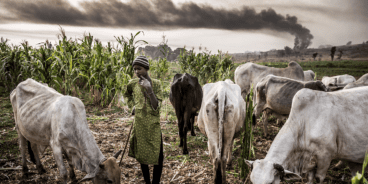
Atrocity Alert No. 117: Afghanistan, South Sudan and Yemen
Atrocity Alert is a weekly publication by the Global Centre for the Responsibility to Protect highlighting situations where populations are at risk of, or are enduring, mass atrocity crimes.
Sectarian terrorist attacks increase in Afghanistan
On Friday, 3 August, a gun and bomb attack on a Shia mosque in the city of Gardez left at least 39 people dead, including a number of children. The Gardez mosque attack is the latest in a growing number of terrorist attacks by the Islamic State of Iraq and the Levant-Khorasan (ISIL-K) against civilians and civilian infrastructure across Afghanistan. Recent targets have included a medical center for midwives, a government refugee assistance office, and a delegation of Sikh and Hindu community leaders.
According to the UN Assistance Mission in Afghanistan (UNAMA), 1,692 civilians were killed during the first six months of 2018 – the most civilian deaths since the UN began recording and reporting such figures in 2009. ISIL-K was deemed responsible for more than half of all suicide attacks that resulted in civilian deaths, including a growing number of attacks that deliberately target Afghanistan’s vulnerable religious minorities.
The right to freedom of religion is codified within the Universal Declaration of Human Rights. International Humanitarian Law also expressly prohibits deliberate attacks against civilians and civilian property, including places of worship. In response to the Gardez mosque attack the UN Secretary-General’s Special Representative for Afghanistan and head of UNAMA, Tadamichi Yamamoto, commented that “brutal and senseless attacks against people at prayer are atrocities” that “may amount to war crimes.”
The Afghan government, with support from the international community, must increase efforts to protect civilians’ security as well as their right to freedom of religion and conscience, especially in advance of the October 2018 parliamentary and district elections. The Afghan security forces and all international military forces in Afghanistan must prioritize the protection of civilians and strictly adhere to International Humanitarian and Human Rights Law while combating ISIL-K, the Taliban and other armed extremist groups.
Child soldiers released as South Sudan’s leaders sign peace deal
After nearly five years of armed conflict the President of South Sudan, Salva Kiir, and main opposition leader, Riek Machar, signed yet another peace deal on Sunday, 5 August, after agreeing on outstanding items from the 27 June Khartoum Declaration. The two political leaders agreed on a power-sharing arrangement whereby Machar will regain his position as First Vice President and return to Juba from exile. Special Representative of the UN Secretary-General for South Sudan, David Shearer, called the agreement “a big step forward in terms of bringing peace to South Sudan.”
Meanwhile, on 7 August 331 child soldiers were released during a ceremony in Gbudue State – an important positive gesture following the peace agreement. This marked the third major release of child soldiers in South Sudan so far this year.
South Sudan’s civil war, which began in December 2013, has plunged the country deep into economic and humanitarian crisis. At least 7 million people are severely food insecure and the country remains on the brink of famine. The conflict has killed tens of thousands of civilians and displaced more than 4.5 million.
South Sudan’s rival political leaders have signed and broken at least four previous formal agreements to end the armed conflict and hold perpetrators of mass atrocities accountable. After almost five years of immense suffering, the people of South Sudan deserve peace with justice, not gestures without substance. In order for the latest peace deal to be sustainable, atrocity crimes must be addressed and the perpetrators held accountable. The international community, especially the African Union, should work with the signatories of the peace agreement to ensure that it is fully and expeditiously implemented.
Battle for Hodeidah continues in Yemen
The ongoing battle for control of the crucial Yemeni port city of Hodeidah intensified over the past week. In particular, airstrikes by the Saudi and United Arab Emirates (UAE)-led coalition on the Houthi-controlled city of approximately 600,000 people have resulted in dozens of civilian casualties. On 2 August an alleged airstrike on a fish market and the entrance to Yemen’s largest hospital left at least 55 people dead.
Yemen is the worst humanitarian crisis in the world, with at least 8.4 million people at risk of famine. Hodeidah is the entry port for approximately 80 percent of the food and fuel imports upon which over 22 million Yemenis in need of aid depend. The offensive on Hodeidah and damage to civilian infrastructure places millions at risk of starvation. Hostilities in Hodeidah could also potentially violate UN Security Council (UNSC) Resolutions 2140 and 2216, regarding obstruction of the delivery of humanitarian assistance.
Despite a growing death toll, ongoing war crimes and crimes against humanity, and the threat of catastrophic famine, the UNSC has not passed a substantive resolution on Yemen in over three years.
On 2 August UN Special Envoy Martin Griffiths announced that he will hold consultations with the government of Yemen and the Houthis on 6 September as a first step towards reconvening political negotiations. In support of his efforts the UNSC should condemn the escalation of fighting in Hodeidah and demand an immediate ceasefire. The Council should also impose sanctions on those responsible for potential war crimes, including the targeting of civilians and civilian infrastructure.
All UN member states should immediately halt the sale of weapons to parties to the conflict who routinely violate International Humanitarian Law, including Saudi Arabia and the UAE.
Related Publications


Atrocity Alert No. 444: Nigeria, Haiti and South Sudan
